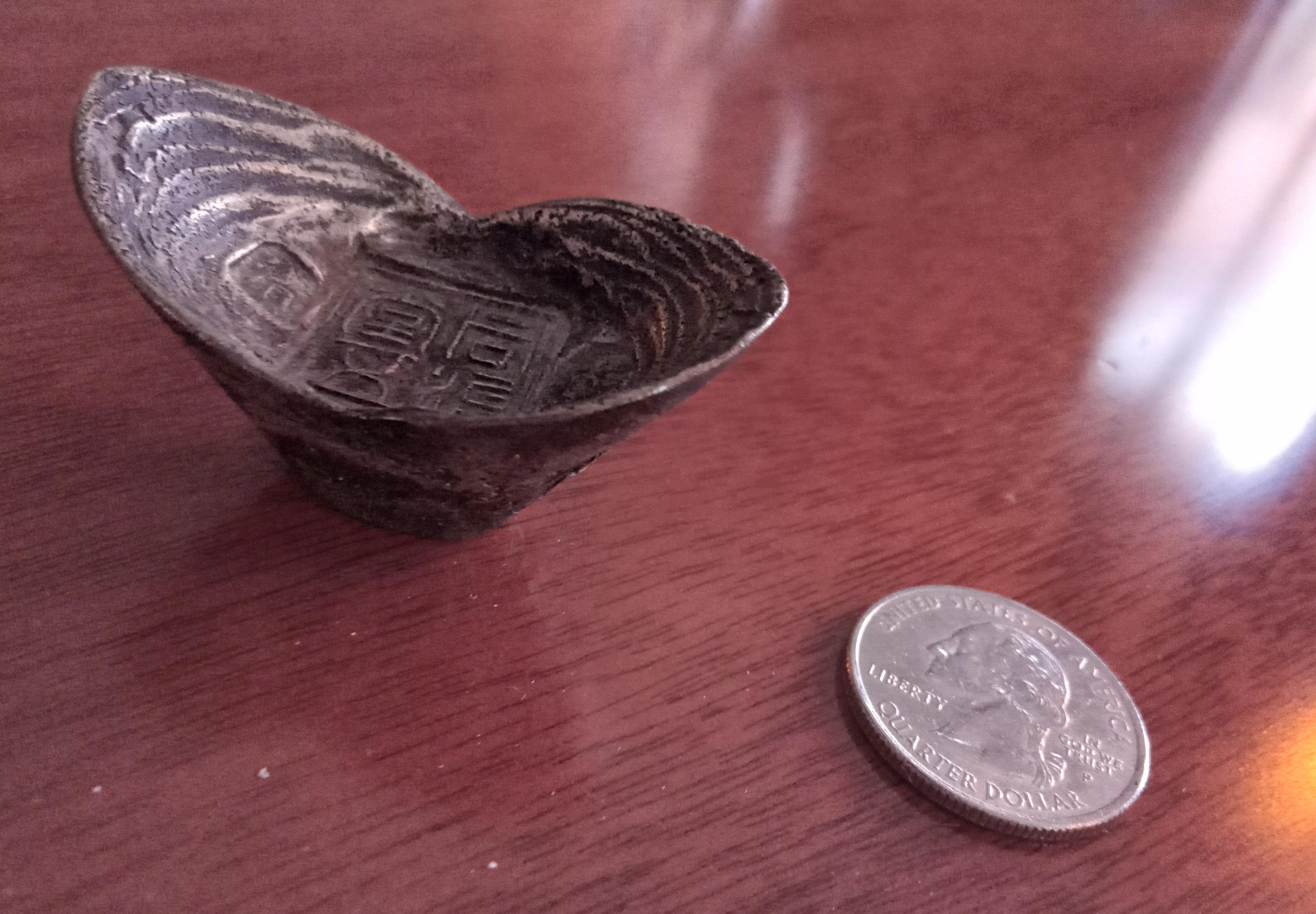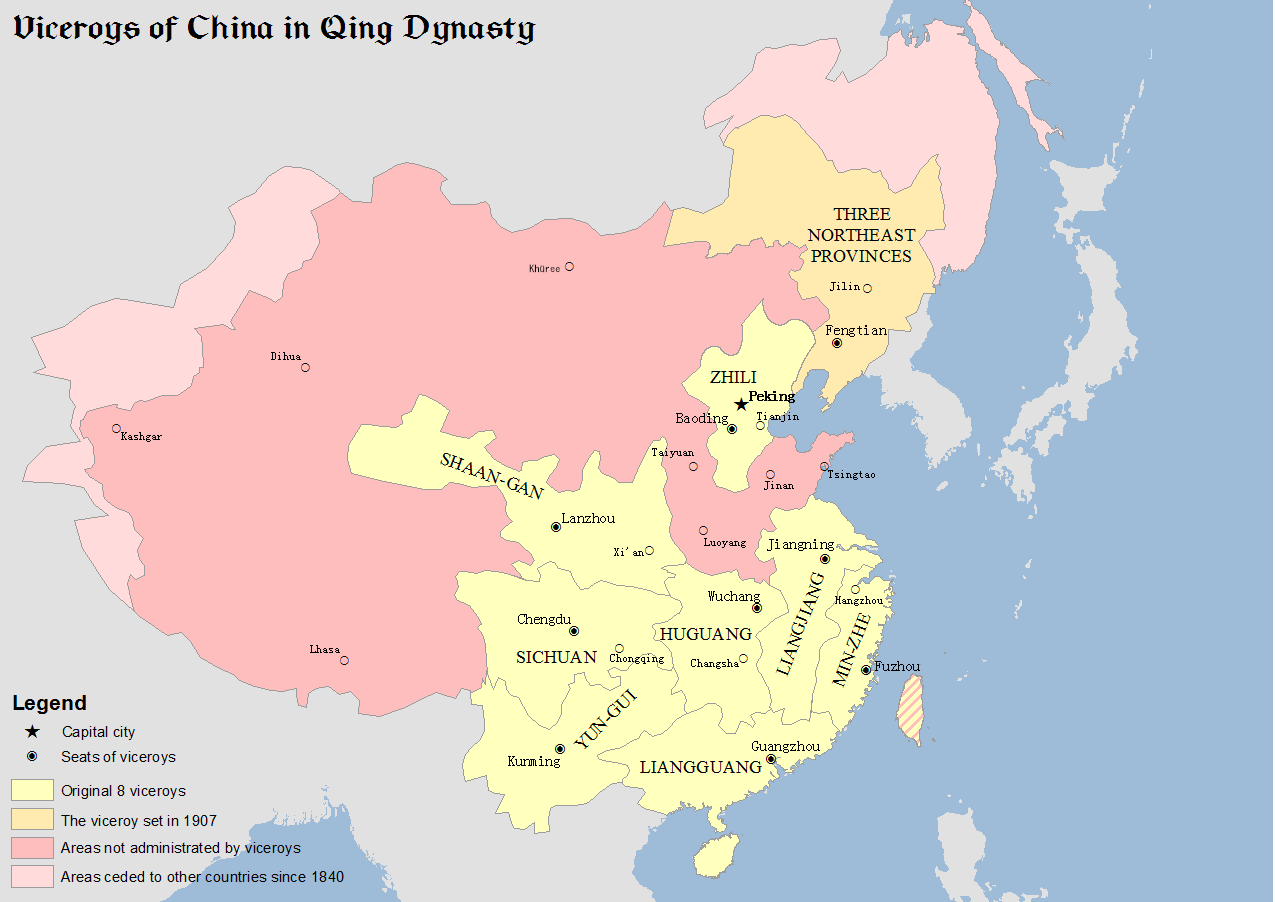|
Mackay Treaty
The Mackay Treaty () was a sixteen article treaty signed by the governments of Great Britain and the Chinese Qing dynasty on 5September 1902. Under the terms of the treaty, the ''likin'' system of taxation was abolished and the first moves made to abolish extraterritoriality for foreign nationals. Background The treaty with the British as well as those that the Qing signed with, the US and Japan, between 1902–03 arose from Article 11 of the 1901 Final Protocol for the Settlement of the Disturbances of 1900 also known as the "Boxer Protocol", which stated that "The Chinese Government has agreed to negotiate the amendments deemed necessary by the foreign governments to the treaties of commerce and navigation and the other subjects concerning commercial relations, with the object of facilitating them." These were the last treaties signed by the Qing before the 1911 fall of the dynasty. Negotiating teams The Chinese delegation comprised Lü Haihuan (1840–1927), president of ... [...More Info...] [...Related Items...] OR: [Wikipedia] [Google] [Baidu] |
Great Britain
Great Britain is an island in the North Atlantic Ocean off the northwest coast of continental Europe. With an area of , it is the largest of the British Isles, the largest European island and the ninth-largest island in the world. It is dominated by a maritime climate with narrow temperature differences between seasons. The 60% smaller island of Ireland is to the west—these islands, along with over 1,000 smaller surrounding islands and named substantial rocks, form the British Isles archipelago. Connected to mainland Europe until 9,000 years ago by a landbridge now known as Doggerland, Great Britain has been inhabited by modern humans for around 30,000 years. In 2011, it had a population of about , making it the world's third-most-populous island after Java in Indonesia and Honshu in Japan. The term "Great Britain" is often used to refer to England, Scotland and Wales, including their component adjoining islands. Great Britain and Northern Ireland now constitute the ... [...More Info...] [...Related Items...] OR: [Wikipedia] [Google] [Baidu] |
Zhang Zhidong
Zhang Zhidong () (4 September 18375 October 1909) was a Chinese politician who lived during the late Qing dynasty. Along with Zeng Guofan, Li Hongzhang and Zuo Zongtang, Zhang Zhidong was one of the four most famous officials of the late Qing dynasty. Known for advocating controlled reform and modernization of Chinese troops, he served as the governor of Shanxi Province and viceroy of Huguang, Liangguang and Liangjiang, and also as a member of the Grand Council. He took a leading role in the abolition of the Imperial examination system in 1905. The Red Guards destroyed his tomb in 1966 during the Cultural Revolution. His remains were rediscovered in 2007 and reburied with honors. Other names Zhang Zhidong was also known by other names. An older Wade–Giles form was Chang Chih-tung. His courtesy name was Xiaoda () or Xiangtao (). His pseudonyms were Xiangyan (), Hugong (), Wujing Jushi () and Baobing (). The posthumous name given to him by the Qing government was Wenxiang ( ... [...More Info...] [...Related Items...] OR: [Wikipedia] [Google] [Baidu] |
1902 In China
Events from the year 1902 in China. Incumbents * Guangxu Emperor (23rd year) Events * signing of the Mackay Treaty — a sixteen article treaty signed by the governments of Great Britain and the Chinese Qing dynasty on 5 September 1902. Under the terms of the treaty, the likin system of taxation was abolished and the first moves made to abolish extraterritoriality for foreign nationals. Births * 7 May — Guo Tianmin Guo Tianmin (; 1905 – 26 May 1970) was a general in the People's Liberation Army of the People's Republic of China from Hubei. He was a descendant of the Tang dynasty general Guo Ziyi. Early life Guo had his primary education in the prov ... (郭天民, 1902 – 1970) was a general in the People's Liberation Army of the People's Republic of China from Hubei References {{Year in Asia, 1902 ... [...More Info...] [...Related Items...] OR: [Wikipedia] [Google] [Baidu] |
1902 Treaties
Nineteen or 19 may refer to: * 19 (number), the natural number following 18 and preceding 20 * one of the years 19 BC, AD 19, 1919, 2019 Films * ''19'' (film), a 2001 Japanese film * ''Nineteen'' (film), a 1987 science fiction film Music * 19 (band), a Japanese pop music duo Albums * ''19'' (Adele album), 2008 * ''19'', a 2003 album by Alsou * ''19'', a 2006 album by Evan Yo * ''19'', a 2018 album by MHD * ''19'', one half of the double album ''63/19'' by Kool A.D. * '' Number Nineteen'', a 1971 album by American jazz pianist Mal Waldron * ''XIX'' (EP), a 2019 EP by 1the9 Songs * "19" (song), a 1985 song by British musician Paul Hardcastle. * "Nineteen", a song by Bad4Good from the 1992 album ''Refugee'' * "Nineteen", a song by Karma to Burn from the 2001 album ''Almost Heathen''. * "Nineteen" (song), a 2007 song by American singer Billy Ray Cyrus. * "Nineteen", a song by Tegan and Sara from the 2007 album '' The Con''. * "XIX" (song), a 2014 song by Slipk ... [...More Info...] [...Related Items...] OR: [Wikipedia] [Google] [Baidu] |
Henry Petty-Fitzmaurice, 5th Marquess Of Lansdowne
Henry Charles Keith Petty-Fitzmaurice, 5th Marquess of Lansdowne, (14 January 18453 June 1927), was a British statesman who served successively as Governor General of Canada, Viceroy of India, Secretary of State for War and Secretary of State for Foreign Affairs. In 1917, during the First World War, he wrote the "Lansdowne Letter", advocating in vain a compromise peace. A millionaire, he had the distinction of having held senior positions in Liberal and Conservative Party governments. Early years, 1845–1882 A great-grandson of British Prime Minister Lord Shelburne (later 1st Marquess of Lansdowne) and the eldest son of Henry Petty-Fitzmaurice, 4th Marquess of Lansdowne, and his wife, Emily, 8th Lady Nairne (''née'' de Flahaut), Henry Charles Keith Petty-Fitzmaurice was born in London in 1845. He held the courtesy title ''Viscount Clanmaurice'' from birth to 1863 and then the courtesy title ''Earl of Kerry'' until he succeeded to the marquessate in 1866. Upon his mother's d ... [...More Info...] [...Related Items...] OR: [Wikipedia] [Google] [Baidu] |
British Newspaper Archive
The British Newspaper Archive web site provides access to searchable digitized archives of British and Irish newspapers. It was launched in November 2011. History The British Library Newspapers section was based in Colindale in north London, until 2013, and is now divided between the St Pancras and Boston Spa sites. The library has an almost complete collection of British and Irish newspapers since 1840. This is partly because of the legal deposit legislation of 1869, which required newspapers to supply a copy of each edition of a newspaper to the library. London editions of national daily and Sunday newspapers are complete back to 1801. In total, the collection consists of 660,000 bound volumes and 370,000 reels of microfilm containing tens of millions of newspapers with 52,000 titles on 45 km of shelves. After the closure of Colindale in November 2013, access to the 750 million original printed pages was maintained via an automated and climate-controlled storage facilit ... [...More Info...] [...Related Items...] OR: [Wikipedia] [Google] [Baidu] |
Evening Telegraph (Dundee)
The ''Evening Telegraph'' is a local newspaper in Dundee, Scotland. Known locally as the ''Tele'' (usually pronounced ''Tully or Tilly''), it is the sister paper of '' The Courier'', also published by Dundee firm D. C. Thomson & Co. Ltd. It was founded in 1877. Dave Lord is the Evening Telegraph's current editor. History Originally founded by John Leng, the Evening Telegraph began to adopt its current conservative and populist Populism refers to a range of political stances that emphasize the idea of "the people" and often juxtapose this group against " the elite". It is frequently associated with anti-establishment and anti-political sentiment. The term developed ... editorial style after it was acquired by DC Thomson. References External links * Newspapers published in Scotland Mass media in Dundee Daily newspapers published in the United Kingdom Right-wing populism in the United Kingdom {{Scotland-newspaper-stub ... [...More Info...] [...Related Items...] OR: [Wikipedia] [Google] [Baidu] |
China Association
The China Association was a British merchants association established to represent the interests of British companies trading with China, Hong Kong and Japan. Members of the association included representatives of the large China Houses such as Swire & Sons; Jardine, Matheson & Co; Paton & Baldwins and Shell Petroleum, in addition to Members of Parliament and retired consular and military officials returned from service in the Far East. The work of the China Association was to lobby the British Government and the authorities in China on behalf of its members. The Association often acted in conjunction with the London Chamber of Commerce, local Chambers and the Federation of British Industries. Foundation A proposal for the formation of a 'China Association' was made at an inaugural dinner held for 'gentlemen with some connection to the Far East', at the Thatched House Club in London, on 4 March 1889. The China Association was formally constituted at a meeting held on 11 Apri ... [...More Info...] [...Related Items...] OR: [Wikipedia] [Google] [Baidu] |
Tael
Tael (),"Tael" entry at the . also known as the tahil and by , can refer to any one of several used in and |
History Of Opium In China
The history of opium in China began with the use of opium for medicinal purposes during the 7th century. In the 17th century the practice of mixing opium with tobacco for smoking spread from Southeast Asia, creating a far greater demand. Imports of opium into China stood at 200 chests annually in 1729, when the first anti-opium edict was promulgated. By the time Chinese authorities reissued the prohibition in starker terms in 1799, the figure had leaped; 4,500 chests were imported in the year 1800. The decade of the 1830s witnessed a rapid rise in opium trade, and by 1838, just before the First Opium War, it had climbed to 40,000 chests. The rise continued on after the Treaty of Nanking (1842) that concluded the war. By 1858 annual imports had risen to 70,000 chests (), approximately equivalent to global production of opium for the decade surrounding the year 2000. By the late 19th century Chinese domestic opium production challenged and then surpassed imports. The 20th cen ... [...More Info...] [...Related Items...] OR: [Wikipedia] [Google] [Baidu] |
Viceroy Of Liangjiang
The Viceroy of Liangjiang or Viceroy of the Two Jiangs, fully referred to in Chinese as the Governor-General of the Two Yangtze Provinces and Surrounding Areas Overseeing Military Affairs, Provisions and Funds, Manager of Waterways, Director of Civil Affairs, was one of eight regional Viceroys in China proper during the Qing dynasty. The Viceroy of Liangjiang had jurisdiction over Jiangsu, Jiangxi and Anhui provinces. Because Jiangsu and Anhui were previously part of a single province, Jiangnan ("south of the Yangtze"), they were thus known, along with Jiangxi ("west of the Yangtze"), as the two ''jiang''s, hence the name "Liangjiang" ("two Jiangs"). History The office of Viceroy of Liangjiang originated in 1647 during the reign of the Shunzhi Emperor. It was called "Viceroy of the Three Provinces of Jiangdong, Jiangxi and Henan" (江東江西河南三省總督) and headquartered in Jiangning (江寧; present-day Nanjing, Jiangsu). In 1652, the office was renamed "Viceroy of ... [...More Info...] [...Related Items...] OR: [Wikipedia] [Google] [Baidu] |
Liu Kunyi
Liu Kunyi () (January21, 1830October6, 1902) was a Chinese official who came to prominence during the government suppression of the Taiping Rebellion and was active in the following Self-Strengthening Movement in the second half of the nineteenth century, the late Qing dynasty. He was native of Xinning County, Hunan. Biography Liu held a senior licentiate degree (jinshi) from the imperial examination system. He entered the Hunan army in 1855, and worked under Li Hongzhang during the suppression of the Taiping Rebellion. In recognition of his services, he was created a baron and awarded the position of governor of Jiangxi, a role in which he served from 1865 to 1874. In 1875, he was given the position of Viceroy of Liangjiang, but was almost immediately transferred to the post of Viceroy of Liangguang, where he remained for the next four years. He was then returned to the former post, where he served until 1881. In addition to his regular duties in this post, he was asked in ... [...More Info...] [...Related Items...] OR: [Wikipedia] [Google] [Baidu] |



